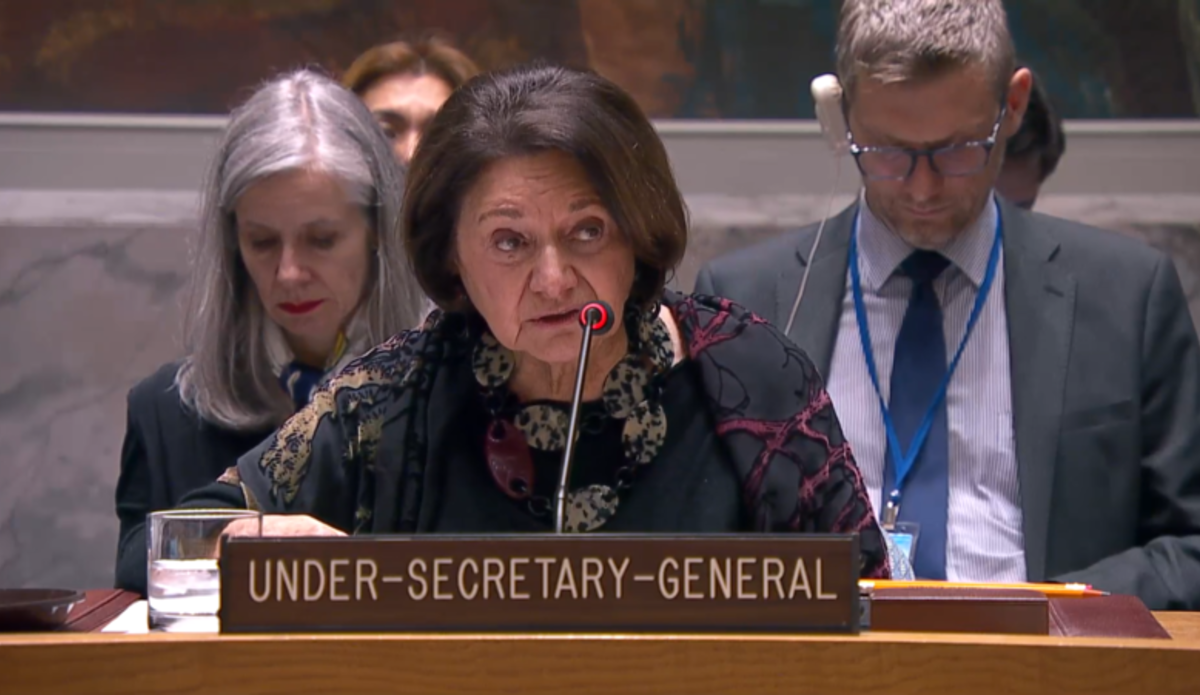Under-Secretary-General Rosemary A. DiCarlo’s
Remarks to the Security Council on Non-proliferation
(Implementation of Resolution 2231 (2015))
New York, 17 December 2024
Thank you, Mister President, for the opportunity to brief the Council on the Joint Comprehensive Plan of Action (JCPOA) and the implementation of resolution 2231 (2015).
With ten months remaining until Resolution 2231’s Termination Day, the impasse on restoring the JCPOA persists. Meanwhile, since I last briefed the Council on this issue, the regional context has deteriorated further. Against this backdrop, the need for a comprehensive, long-term-solution that would restore the objectives of the Plan has never been greater.
The United States has not returned to the Plan, nor has it lifted or waived the unilateral sanctions it reimposed after withdrawing from the JCPOA in May 2018. And, it has not extended waivers regarding the trade in oil with the Islamic Republic of Iran.
Iran, for its part, has not reversed any of the steps it has taken since May 2019 to move away from its nuclear-related commitments.
In its most recent quarterly report, dated 19 November 2024, the International Atomic Energy Agency (IAEA) observed again that, its verification and monitoring activities related to the Joint Comprehensive Plan of Action have been, “seriously affected by the cessation of Iran’s implementation of its nuclear-related commitments under the JCPOA”. IAEA also noted that it has lost continuity of knowledge on many aspects of the nuclear programme of Iran. In plain words, the Agency is unable to assure the international community of the peaceful nature of Iran’s nuclear programme.
Also, the IAEA remains unable to verify the stockpile of enriched uranium in the country, a situation that has persisted since February 2021. However, it estimated that Iran’s total enriched uranium stockpile is approximately thirty-two times the amount allowable under the JCPOA.
This includes increased quantities of uranium enriched to 20% and 60%. Such a stockpile of enriched uranium and level of enrichment remain very concerning.
The Agency has also issued two ad hoc reports that are not reflected in the Secretary-General’s report. These describe Iran’s intention to commence previously declared enrichment activities exceeding its JCPOA limits. They also contain information about Iran’s activities to increase production of uranium enriched to 60%.
Mister President,
During the reporting period, the Secretary-General received letters from some JCPOA participants. The Permanent Representatives of France, Germany and the United Kingdom exchanged differing views with the Permanent Representatives of Iran and the Russian Federation on the root causes of the current impasse regarding implementation of the Plan; their respective steps taken as a result; and their views on the path forward.
The Secretary-General is concerned about the ongoing and persistent disagreements among these Member States at such a critical juncture. Despite these differences, these Member States have expressed their commitments to making constructive efforts to resolve their differences. I urge all JCPOA participants and the United States to rise to this challenge.
Mister President,
I will now turn to the restrictive measures set out in annex B of resolution 2231 (2015). The only measures that remain in effect are contained in paragraph 2 of annex B and pertain to nuclear activities and transfers.
These measures will remain in place until 18 October 2025, unless otherwise decided by the Council.
No information regarding actions alleged to be inconsistent with this paragraph was brought to the attention of the Secretariat during the reporting period.
Meanwhile, there were, again, no new proposals submitted to the procurement channel in the last six months in this reporting cycle.
The Security Council, however, received four notifications regarding the nuclear-related restrictive measures for certain activities consistent with the Plan.
Mister President,
In closing, I would like to echo the Secretary-General’s call for participants in the Plan and the United States to prioritize multilateralism and diplomacy, principles that made agreement on the JCPOA in 2015 possible. The parties should summon the political will and urgently re-engage in negotiations. Time is of the essence. While the onus is on the JCPOA participants and the US, their success or failure matters to all of us. The region cannot afford further instability. There must be genuine commitment to dialogue and diplomacy. That is the way to restore confidence in the peaceful nature of Iran’s nuclear programme, realize the aspirations of the Iranian people, and contribute to stability in the region and beyond.
Finally, I thank Her Excellency Vanessa Frazier for her leadership as Facilitator for resolution 2231 over the past two years, as well as the Coordinator of the Procurement Working Group of the Joint Commission for our continued cooperation.
Thank you, Mister President.

